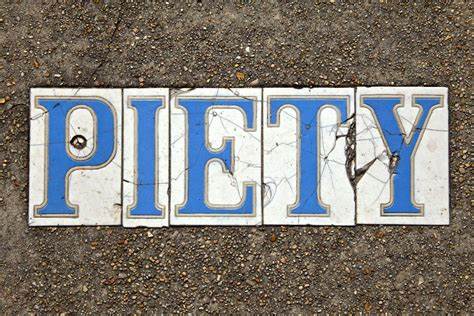By Kevin B. McCarthy, J.D., S.T.L.

This entry aims to discuss the special virtue of Piety, a virtue allied to the cardinal virtue of justice and incumbent upon us because of our duty in Faith to worship, to love, God, to honor our family ties, and give homage to our nation. While Piety is allied to Justice, ¶1827 of the Catechism of the Catholic Church instructs:
“The practice of all the virtues is animated and inspired by charity, which “binds everything together in perfect harmony;” It is the form of the virtues; it articulates and orders them among themselves; it is the source and the goal of their Christian practice. Charity upholds and purifies our human ability to love, and raises it to the supernatural perfection of divine love.”
 As Christians, what we owe to God, our parents and other family members, and our country and its citizens, takes on great importance in the context of “Unity and Peace”. So this special virtue of Piety is known as “Religion” or “Love of God” regarding our God (The Most Holy Trinity), simply as “Piety” toward our parents and family, and as “Patriotism” when rendered to our Country; but, all three are a form of Piety generally.
As Christians, what we owe to God, our parents and other family members, and our country and its citizens, takes on great importance in the context of “Unity and Peace”. So this special virtue of Piety is known as “Religion” or “Love of God” regarding our God (The Most Holy Trinity), simply as “Piety” toward our parents and family, and as “Patriotism” when rendered to our Country; but, all three are a form of Piety generally.
Let us begin by understanding that our Trinitarian God has created us through the cooperation of our parents and by giving us a particular nation at a particular time within which to live:
And He made from one every nation of men to live on all the face of the earth, having determined allotted periods and the boundaries of their habitation.
− Acts 17:26 (R.S.V.) (Emphasis added.)
“Honor your father and your mother, that your days may be long in the land which the Lord your God gives you.”
− Exodus 20:12 (R.S.V.) (Emphasis added.)
Let us first consider Christian “virtues” generally. The Church, in the Catechism of the Catholic Church, introduces its article on “Virtues” with these statements, the first sentence coming from Sacred Scripture: in Phillipians 4:8

– “A virtue is an habitual and firm disposition to do the good. It allows the person not only to perform good acts, but to give the best of himself. The virtuous person tends toward the good with all his sensory and spiritual powers; he pursues the good and chooses it in concrete actions.”
Catechism of the Catholic Church, ¶1803
So, virtue, an habitual and firm disposition to do the good, is essential to success in our lifelong Christian discipleship. Simply put, virtue is a good habit consonant with our nature.
 So, what do we know about this special virtue of Piety? In Question 101 in his Summa Theologica, Ia Iae, Saint Thomas Aquinas addresses the special virtue of Piety (Pietas). In answering the First Article of Question 101 according to the typical “quodlibetal” format, in the “Sed contra est” (“But against this is”), Saint Thomas Aquinas cites secular Roman philosopher Marcus Tullius Cicero to define Piety: “it is by piety that we do our duty towards our kindred and well-wishers of our country and render them faithful service.” (As an interesting aside, although Cicero was a famous Roman statesman and philosopher and not a Christian, yet his thought (like Greeks, including Aristotle) has been used by the Church to explain basic truths, including in the Catechism of the Catholic Church [¶1956] section on the natural law (“right reason”). After quoting Cicero, Saint Thomas proceeds immediately to explain in his same usual manner which begins with “Rispondeo dicendum quod” (“I answer saying that”):
So, what do we know about this special virtue of Piety? In Question 101 in his Summa Theologica, Ia Iae, Saint Thomas Aquinas addresses the special virtue of Piety (Pietas). In answering the First Article of Question 101 according to the typical “quodlibetal” format, in the “Sed contra est” (“But against this is”), Saint Thomas Aquinas cites secular Roman philosopher Marcus Tullius Cicero to define Piety: “it is by piety that we do our duty towards our kindred and well-wishers of our country and render them faithful service.” (As an interesting aside, although Cicero was a famous Roman statesman and philosopher and not a Christian, yet his thought (like Greeks, including Aristotle) has been used by the Church to explain basic truths, including in the Catechism of the Catholic Church [¶1956] section on the natural law (“right reason”). After quoting Cicero, Saint Thomas proceeds immediately to explain in his same usual manner which begins with “Rispondeo dicendum quod” (“I answer saying that”):
“Man becomes a debtor to other men in various ways, according to their various excellence and the various benefits received from them. On both counts God holds first place, for He is supremely excellent, and is for us the first principle of being and government. On the second place, the principles of our being and government are our parents and our country, that have given us birth and nourishment.
Consequently man is debtor chiefly to his parents and his country, after God. Wherefore just as it belongs to religion to give worship to God, so does it belong to piety, in the second place, to give worship to one’s parents and one’s country.
The worship due to our parents includes the worship given to all our kindred, since our kinsfolk are those who descend from the same parents, according to the Philosopher (Ethic. viii, 12). The worship given to our country includes homage to all our fellow-citizens and to all the friends of our country. Therefore piety extends chiefly to these.”
– St. Thomas Aquinas
So, Piety includes Patriotism, which makes Patriotism a divine religious obligation derived from our loving relationship with God as something owed to our fellow citizens, in addition to its human social aspect as a custom of our national culture.
God made humankind into Nations:
“And he made from one every nation of men to live on all the face of the earth, having determined allotted periods and the boundaries of their habitation.”
Acts 17:26 (R.S.V.)
“Honor your father and your mother, that your days may be long in the land which the Lord your God gives you.”
Exodus 20:12 (R.S.V.)
So, love The Most Holy Trinity, love your family, and love your Country and your fellow citizens, in that order! Have Unity and Peace with God first, and Unity and Peace will flow out to your Family and your Nation. In this regard, as you journey through Lent, consider daily Mass, making a daily Holy Hour with Jesus in The Most Blessed Sacrament, or at least a daily visit to The Blessed Sacrament, even for just 5 or 10 minutes. Lent is not only a time of self-denial; even more so, it is a time of replacing attachments that are not so good with attachment to God and Godly. Use the Sacraments lovingly; we have Baptism (making each Catholic a “Temple of The Holy Spirit” in whom thus resides The Indwelling Trinity), and we have Confession by which to reconcile in the state of grace. Enhance awareness of The Indwelling Trinity through consistent time with Jesus truly present in The Most Blessed Sacrament and follow readily that holy trajectory aiming for Easter and Pentecost, for Unity and Peace.

